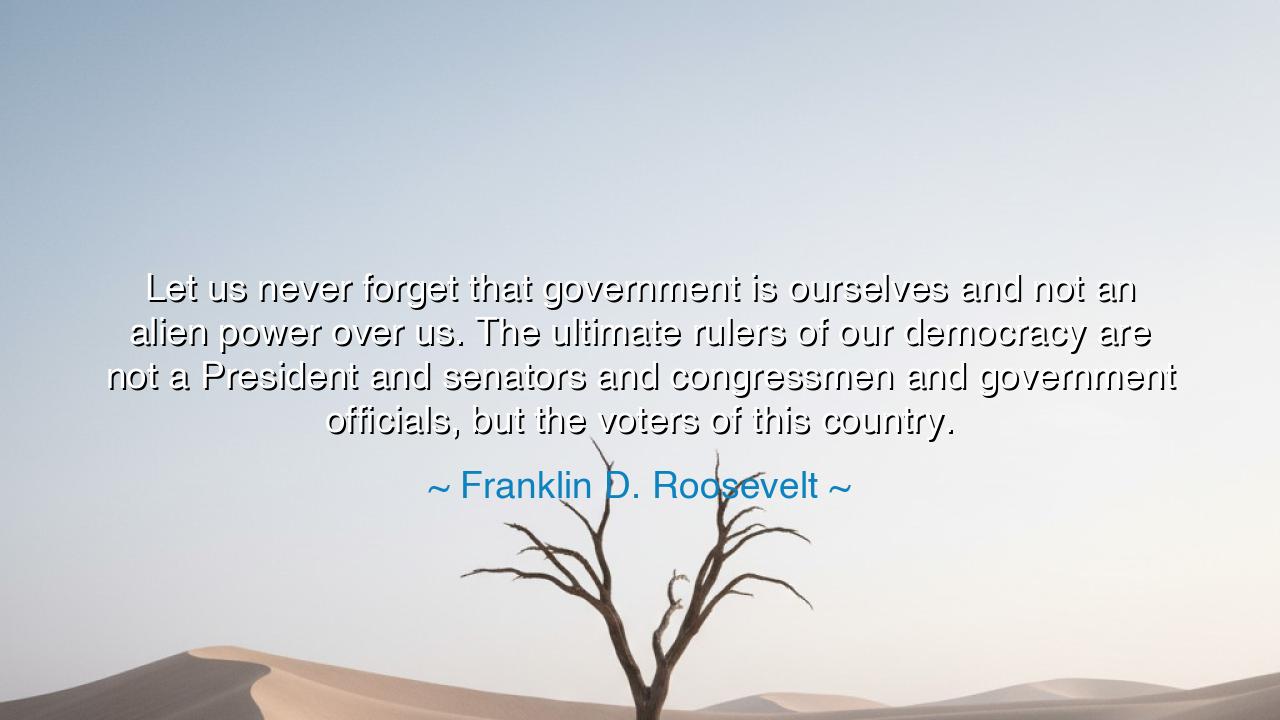
Let us never forget that government is ourselves and not an alien
Let us never forget that government is ourselves and not an alien power over us. The ultimate rulers of our democracy are not a President and senators and congressmen and government officials, but the voters of this country.






In the midst of the Great Depression, when despair clouded the American spirit and faith in institutions trembled, Franklin D. Roosevelt, the steadfast voice of courage, reminded his people of a truth older than nations: “Let us never forget that government is ourselves and not an alien power over us. The ultimate rulers of our democracy are not a President and senators and congressmen and government officials, but the voters of this country.” These words, radiant with conviction, rose like dawn over a weary land. They called upon a people who had forgotten their own strength to remember that power in a democracy flows not downward from thrones, but upward from the hearts and wills of free citizens.
The origin of this quote lies in Roosevelt’s belief that democracy is not a gift bestowed by leaders, but a covenant upheld by the governed. In his speeches throughout the 1930s and 1940s, as storms of poverty and war battered the world, he returned again and again to this sacred principle: that the government is not an external force, not a distant master, but a reflection of the people’s character and choices. In an age when dictators rose across continents, demanding obedience and crushing individuality, Roosevelt’s words rekindled the flame of self-rule — the conviction that liberty endures only so long as the people guard it with vigilance and purpose.
Roosevelt had seen firsthand the fragility of freedom. He watched the rise of fascism in Europe, where citizens surrendered their rights in exchange for promises of order and prosperity. He knew how easily fear could make a people forget their own sovereignty, how swiftly power could consolidate in the hands of the few when the many grew silent. His declaration was not mere rhetoric — it was a warning and a plea: that democracy dies not by conquest, but by neglect; not when tyrants seize power, but when citizens forget they are the source of it. To say “government is ourselves” is to affirm that every law, every policy, every act of justice or injustice begins in the choices of the people.
History, ancient and modern, bears witness to this eternal truth. In the golden days of Athens, the cradle of democracy, the citizens gathered in the agora to debate, to vote, to govern themselves. Their strength lay not in armies, but in participation. Yet when apathy crept in — when the people grew content to let others speak and decide — their freedom faltered, and their city fell to demagogues. The same pattern has echoed through time: from the fall of the Roman Republic, where corruption silenced the voices of the common man, to the revolutions that gave birth to new nations. The fate of liberty has always rested in the courage of the people to remember that they are its guardians.
Roosevelt’s words strike deeper still, for they are not only a call to civic duty but a meditation on human dignity. When he said that government is ourselves, he spoke to the divine spark within every person — the idea that each citizen, no matter how humble, holds a portion of sovereignty. To vote, to speak, to question authority — these are not mere rights but sacred acts, expressions of the belief that every human being has the power and the responsibility to shape the destiny of their nation. In Roosevelt’s philosophy, democracy was not simply a system of governance, but a moral enterprise — the shared labor of conscience and courage among equals.
There is a story, often forgotten, of Roosevelt’s own moment of humility before this truth. During his presidency, as he faced fierce opposition from Congress and the courts, a farmer from the Midwest wrote him a simple letter: “You are my President. Please do not forget us.” Roosevelt later said that this message, more than any law or policy, reminded him whom he truly served. The voters — the people — were not subjects, but the true rulers. Their will was the wellspring of his authority, and their welfare the measure of his success. In that small act of faith from an ordinary man lay the essence of democracy itself: that power belongs to the governed, and rulers exist only to serve.
The lesson, then, is clear and timeless: do not surrender your voice to indifference, nor your power to fear. A government “of the people, by the people, and for the people” survives only when the people remember that it is theirs to defend, to guide, to renew. Every citizen is a steward of liberty; every vote is an act of sovereignty. The moment we see government as “an alien power over us,” we begin to forge our own chains. The moment we remember it is ourselves, we break them.
So let the wisdom of Franklin D. Roosevelt endure like a torch in the darkness: “The ultimate rulers of our democracy are not a President and senators and congressmen and government officials, but the voters of this country.” Let these words awaken the sleeping citizen and humble the proud statesman. For democracy is not sustained by laws alone, but by the spirit of a people who refuse to forget their power. Stand, then, as heirs of that sacred trust — not as subjects of government, but as its very soul. And as long as the people remember that truth, the flame of freedom will never die.






AAdministratorAdministrator
Welcome, honored guests. Please leave a comment, we will respond soon